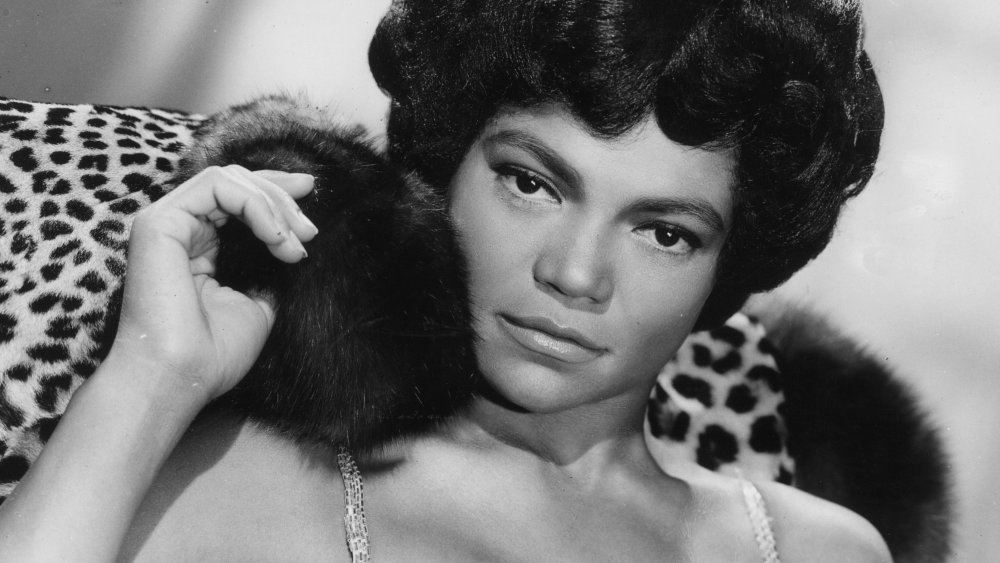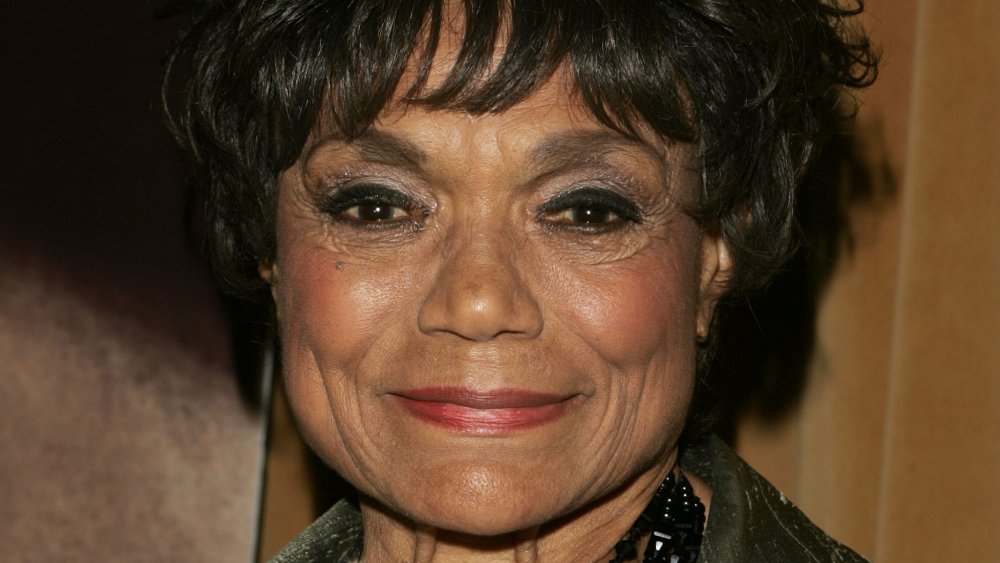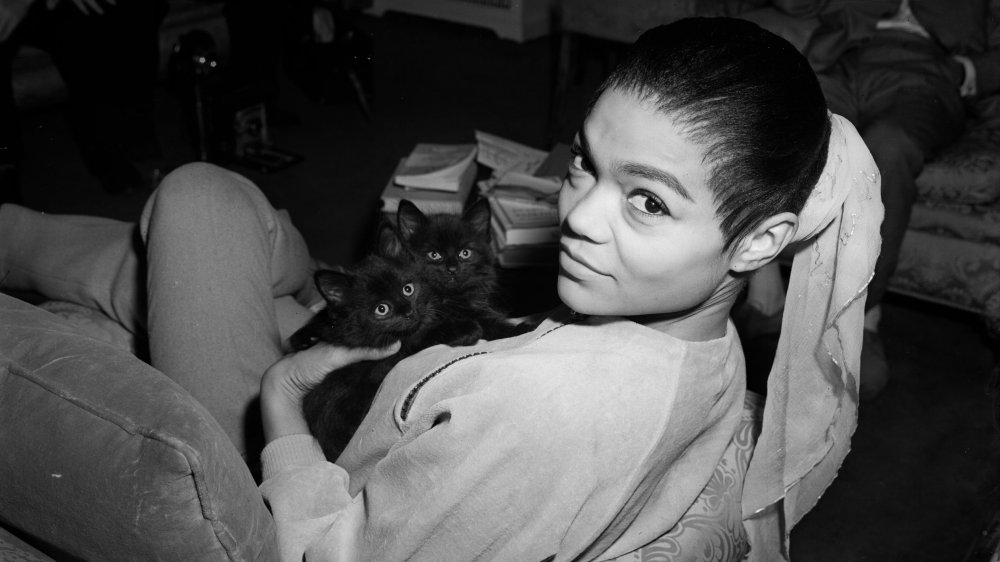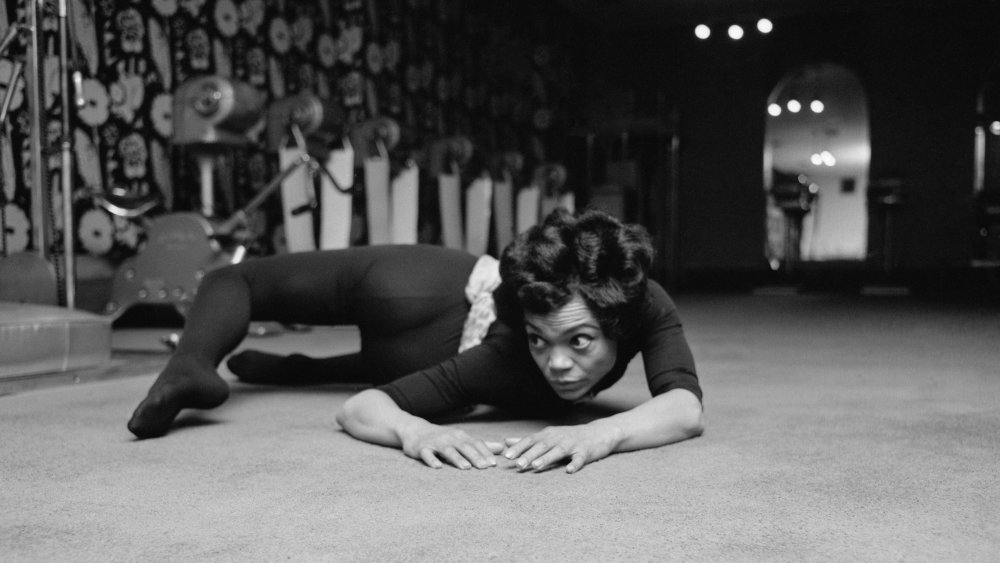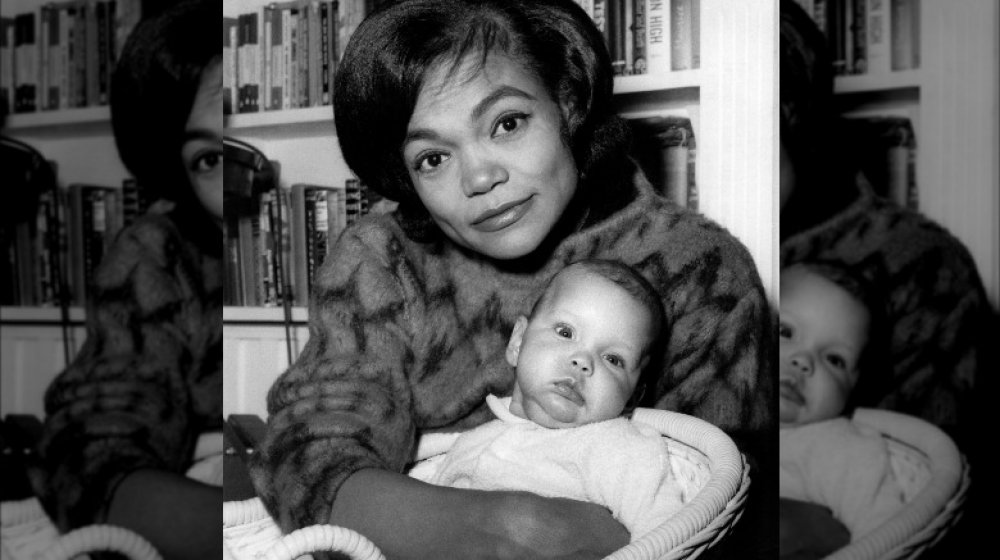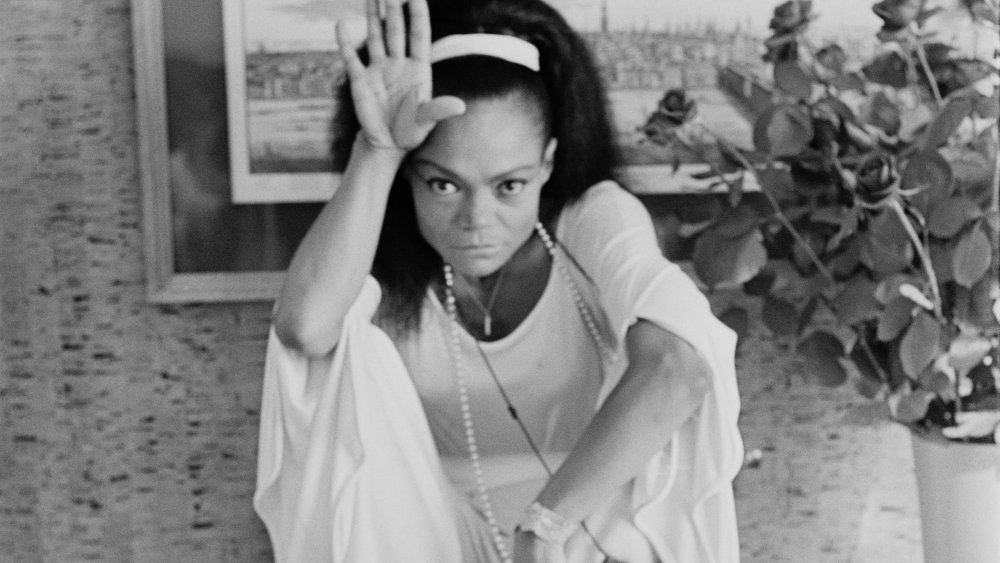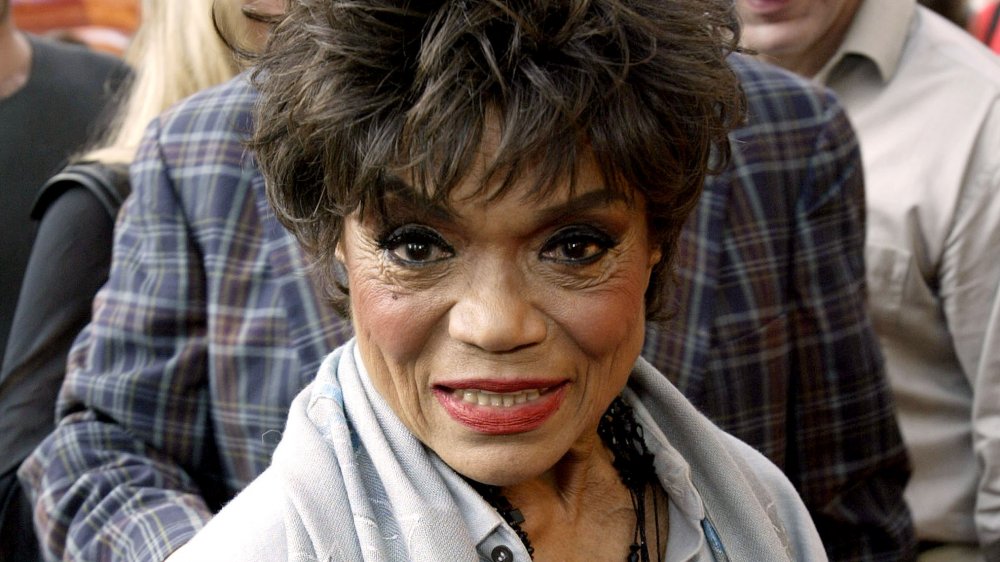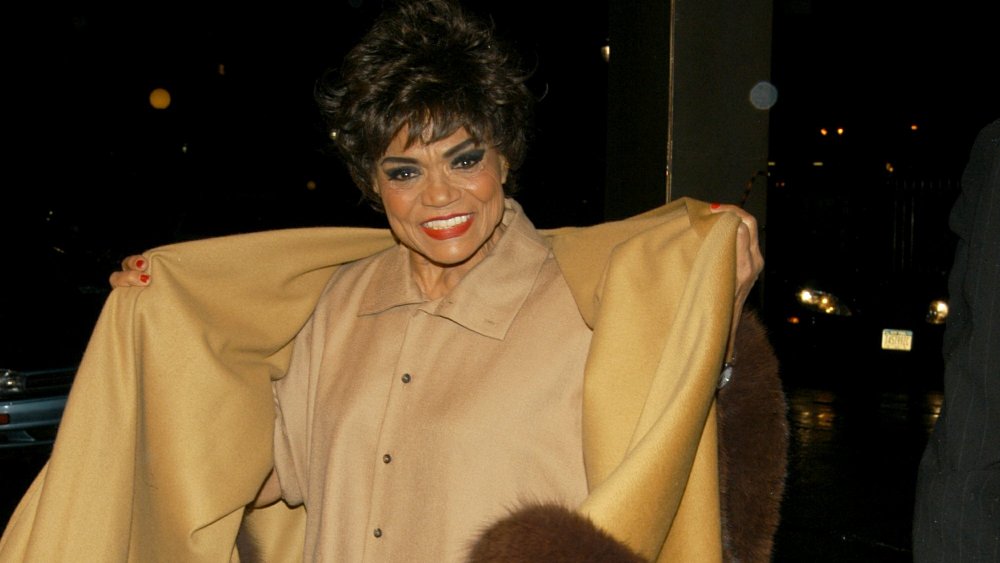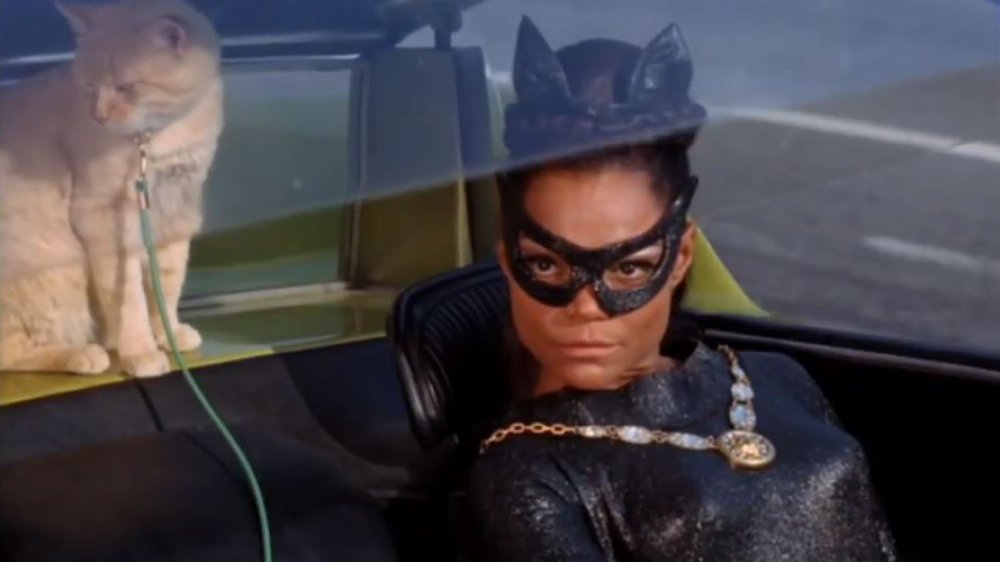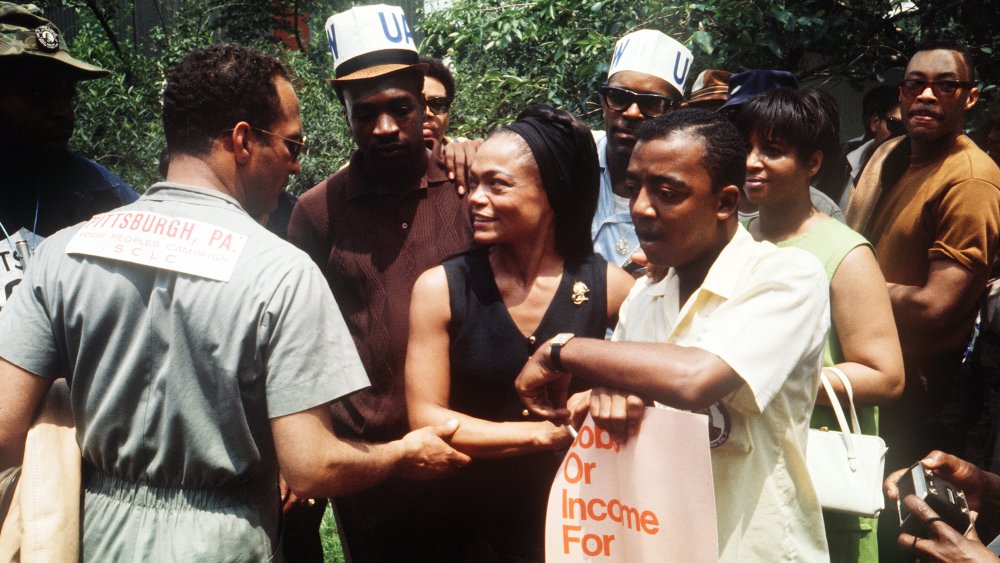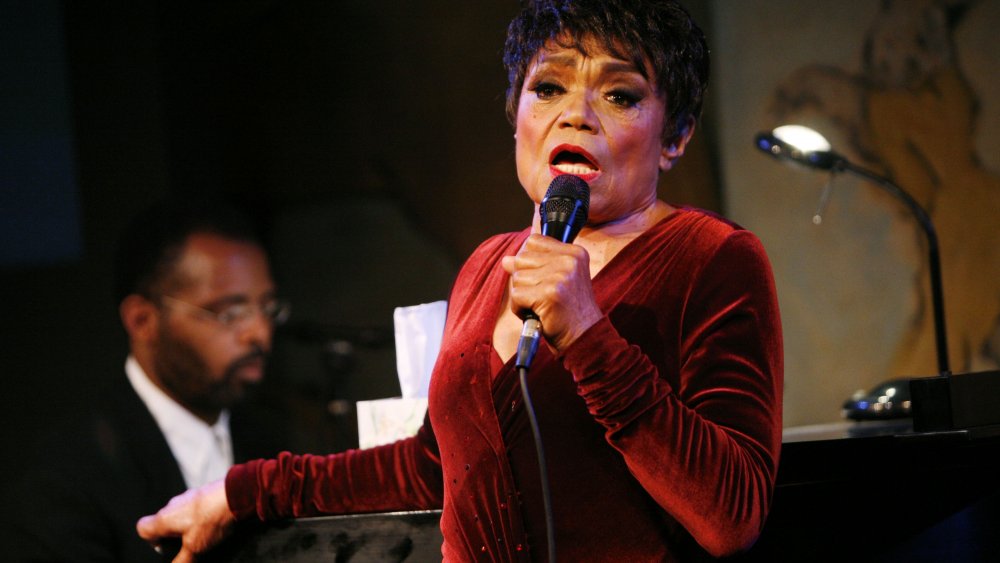The Tragic Real-Life Story Of Eartha Kitt
When singing and dancing on Broadway, Eartha Kitt turned heads, once being hailed as "the most exciting woman in the world." When she starred as Catwoman, Batman's most morally ambiguous foe, her charisma was electric. And when speaking truth to power, she never backed down, even when standing inside the White House itself.
And true, when you look back on the most powerful and influential entertainment stars of the 20th century, Eartha Kitt might not be the first name you think of, but that's only because she was so outspoken and so true to herself that even the feds tried to ruin her career and block her out of the public consciousness. Today, years after her death, Kitt has slowly become recognized for the legend she always was. However, she faced a great deal of pain, abuse, hardships, and government censorship. From the beginning of her life to her later struggles, here's the tragic real-life story of Eartha Kitt.
Eartha Kitt never knew about her origins
In life, there are certain privileges that so many people take for granted, such as knowing your parents and your birthday, which a young Eartha Kitt (born Eartha Mae Keith) didn't have the luxury of experiencing, according to The Guardian.
Born in South Carolina in the 1920s and raised in poverty, Kitt's early days were shrouded in a thick cloud of mystery that she'd never quite penetrate. What happened, to her best understanding (via The Telegraph), was that she was the product of a white plantation owner's son raping her black mother, Anna Mae. Anna Mae raised Kitt in her first few years but never told her when she was born or who her father was, and this subject would pain Kitt throughout her life. In fact, it wouldn't be until 1998, when she was 71 years old, that she'd finally be able to lay eyes on her own birth certificate — a process that necessitated a massive, protracted legal battle on her part — and even then, the authorities chose to black out the name of her father, leaving him forever unknown.
As Eartha's daughter, Kitt Shapiro, would later write, the South Carolina authorities were still "protecting" the name of white plantation owner, even at the dawn of the 21st century, at the cost of the mixed race daughter he sired.
She suffered abandonment and abuse
According to Biography, Eartha Kitt didn't live with her mother, Anna Mae, for very long. Anna Mae resented Kitt for her lighter skin tone, while the outside world oppressed the future star for her black heritage (with some Cherokee roots, as well). Needless to say, this discrimination combo ostracized the young girl. It didn't help that Anna Mae had suffered an abusive childhood herself, which she still bore the scars of.
Regardless, The Guardian writes that when Anna Mae settled with a new romantic partner, she abandoned Kitt. The young girl was sent to live with her Aunt Rosa, and unfortunately, this extended family was no less abusive to her. To "earn her keep," Kitt was forced to pick cotton for them, even though she was less than seven years old. Around this time, Anna Mae fell ill — Kitt later claimed that her mother was probably poisoned — and Kitt was brought to her for a final visit, whereupon she watched her die.
Eartha Kitt's Harlem days
When Eartha Mae Keith was eight years old, her life started to take a different direction. After the death of her mother, the young girl was sent to live with her New York City "aunt," Marnie Kitt, according to The New York Times. And later, the singer came to believe that this woman might've secretly been her true, biological mother. Eartha took Marnie's surname, going from Keith to Kitt, and in contrast to the cotton-picking demanded of her in South Carolina, her new life involved piano lessons, dance lessons, and according to Biography, an enrollment in the New York School of Performing Arts.
This portrait, sadly, wasn't as rosy as it first looked. As with all of the previous adult figures in Kitt's life, Marnie eventually became abusive to her. Kitt fell into a cycle of being beaten, running away from home, and then returning. This pattern reoccurred until she was a teenager, at which point she left Marnie's home for good, becoming homeless. During this time, as she worked in a New York factory, she would sleep on rooftops or in the subway.
Family ... and divorce
Eartha Kitt had many relationships in her life, but she never let them define who she was. Not only did she never compromise for a man, but as Vice points out, she found the sheer concept of doing so completely laughable. As she put it, falling in love should be about loving oneself and then sharing that love together. Though rumors often flew — particularly regarding her relationship with the legendary but really weird film star, Orson Welles — Kitt once mused that, "The most exciting men in my life have been the men who have never taken me to bed."
However, Eartha Kitt did get married in 1960 to Bill McDonald, a Korean war veteran and accountant. They soon had a daughter, Kitt McDonald. Unfortunately, the relationship didn't last. According to The New York Times, the couple divorced in 1963, with Kitt leaving McDonald on grounds of what was then described as "mental cruelty." McDonald didn't show up for court, but he was ordered to pay monthly child support. Later, according to The Guardian, it was revealed that McDonald had been addicted to painkillers.
Following this experience, Kitt never remarried.
Eartha Kitt was blacklisted by the CIA
In 1968, Eartha Kitt was furious about the messed-up war in Vietnam. So when she was invited to a special White House luncheon held by Lady Bird Johnson, according to The Telegraph, she decided to speak out. While watching white woman after white woman give placid speeches regarding "flower pots on the windowsills of poverty," according to Vice, Kitt repeatedly raised her hand to speak and was ignored until the end. Finally, she stood atop her chair, faced the 41 polite dinner guests surrounding her, and said, "I have lived in the gutters. That's why I know what I'm talking about. You send the best of this country off to be shot and maimed. They rebel in the street. ... They don't want to go to school because they're going to be snatched off from their mothers to be shot in Vietnam."
This speech reportedly caused Lady Bird Johnson to break down in tears, but after Kitt left the White House, the CIA got to work. The agency assembled documents, on the request of the president, full of gossip and hearsay regarding the celebrity, which accused her of being a "sadistic nymphomaniac." The CIA used this dossier to sling mud at Kitt's reputation, making it impossible for her to find work. Venues and contracts were lost. The gossip grew louder. This smear campaign forced her to leave the country, in search of jobs in Europe.
Death by cancer
Despite all the hardships she faced in her life, nothing could stop Eartha Kitt, not even the CIA. In fact, even old age barely seemed to slow her down. As the decades passed her by, none of her youth or vigor ever seemed to fade in the slightest. The one thing in life that finally did catch up to her, as with any human being, was her health. In 2006, according to The New York Times, Kitt made the tragic discovery that she'd developed colon cancer. Despite this diagnosis, she kept performing at her max, at one point doing a victorious opening performance for New York City's newly-improved Cafe Carlyle.
As a woman in her early 80s, though, Eartha could only outrun cancer for so long. About two years after the initial discovery of the disease, it finally claimed her. She died in 2008, in Connecticut, at the age of 81 years old, finally ending a career that had spanned six decades.
Her Broadway success
Despite a life filled with tragedy, Eartha Kitt was obviously a super successful performer with many career highlights. And her star truly started to shine when she was a teenager. One day, as reported by The New York Times, the 16-year-old Kitt learned that the Katherine Dunham Dance Company, the nation's first African-American modern dance troupe, was holding auditions in New York. A friend dared her to try out, and she nailed it.
Kitt toured with the group for a few years, according to Biography, then embarked on a solo career as a nightclub singer. In her 20s — as her persona developed into the definitive, bold one remembered today — she performed in Paris cabarets. It was one such performance that caught the eye of one Orson Welles, the famed filmmaker behind Citizen Kane, who promptly cast her as Helen of Troy in his stage adaptation of Dr. Faustus called Time Runs, according to Vice.
Welles famously proclaimed that Kitt was "the most exciting woman in the world," and soon, the world agreed. Upon returning home to New York, Kitt hit multiple Broadway shows, and she followed this success by releasing charts-topping music such as the now-iconic "Santa Baby" and "I Want to be Evil." Soon enough, she also moved to the big screen, earning an Academy Award nomination for her performance in Anna Lucasta. Eartha Kitt's triumphs are impressive enough on their own, but they're made even more significant in the context of her time. After all, she was a powerful, bold, progressive woman of color living in the era of Jim Crow, appearing everywhere from popular music to films.
Eartha Kitt was the Catwoman of her era
Between "Santa Baby" and Broadway, Eartha Kitt's popularity was a game changer, as she was a black woman who commanded the stage, the radio, and the TV screen whenever she appeared. Of course, one of Kitt's most immortal roles will forever be that of Catwoman, the famed Batman villain whom she portrayed in the classic Adam West series of the '60s. Kitt was the third actress to portray the leather-clad femme fatale, but as ComicsVerse argues, she was the Catwoman that mattered most.
Her portrayal was smart, sleek, and intelligent, electrifying the screen whenever she appeared, and she regularly outsmarted the dynamic duo at every turn. Kitt's version of Selina Kyle has continued to influence portrayals of the iconic character, and her casting — as a woman of color, playing a role traditionally considered white — charted the course for the casting of future Catwoman performers like Halle Berry in 2004's Catwoman, and Zoe Kravitz in 2021's The Batman.
As amazing as Kitt's Catwoman was, though, it's important to remember that her legacy runs far deeper than that. In her time, as Vice explains, she was a subversive role model when it came to feminism, civil rights, and sex positivity. Looking back, when it comes to these achievements, she can rightfully be considered an icon.
She was a lifelong advocate for civil rights
Eartha Kitt is often remembered for her showbiz work, and while that was her career, her legacy is defined by so much more than that. From early on, Kitt was a big supporter of the Civil Rights movement, and while she and Dr. Martin Luther King weren't close, they did exchange letters of mutual admiration. She was also connected to Malcolm X, and though she expressed that they had some ideological differences, they once came together to speak at a rally event put together by Jackie Robinson following a church bombing in 1963. Her last encounter with Malcolm X was the Sunday before his death.
According to the National Visionary Leadership Project, Kitt often used her fame to advocate for social justice causes. During the '60s, her contracts strictly required that, for any performance she gave, the audience couldn't be segregated. If she got there and they were, she would send a "bus boy" out to integrate the audience before she went onstage. In later years, according to Black History in America, Kitt fervently championed the cause of LGBTQ+ rights and same-sex marriage.
Eartha Kitt's overseas journey and later career
After running afoul of Lyndon B. Johnson and the CIA, Eartha Kitt was driven into exile. However, while the U.S. government had tried to end her career, she'd never been one to give up or stay quiet. Going to Europe, she went on tour across over 100 countries, singing in 12 languages, and continuing to work steadily. According to The Guardian, Kitt's daughter even went to school in London, to the point where she now considers England like a second home.
Kitt worked this way for a decade, but according to The New York Times, the late '70s saw her make a huge U.S. comeback. She returned to Broadway to star in Timbuktu!, earning her first Tony Award nomination. President Jimmy Carter personally invited her back to the White House as an apology for her past treatment. And after that, she never slowed down. She created dance music in the '80s and wrote three autobiographies, including I'm Still Here: Confessions of a Sex Kitten. She earned a second Tony nomination for The Wild Party musical, a Grammy nomination for her cabaret collection Back in Business, and she nabbed two Daytime Emmy Awards in the 2000s for her voice acting role as Yzma in The Emperor's New School. Kitt continued taking risks, challenging the status quo, and trying new roles well into her elderly years.
